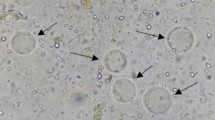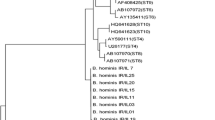Abstract
Blastocystis is one of the most common gut parasites found in the intestinal tract of humans and animals. We have previously reported the irregular shedding of Blastocystis cysts in stools from infected patients. In the present study, we assess the factors influencing shedding patterns from a Blastocystis ST3-infected IBS patient. The stools samples were voluntarily submitted for examination for a period of 30 days from Blastocystis ST3-infected IBS patient. A questionnaire on the factors that could influence the shedding pattern of the cysts was designed to assess the following information: (a) the frequency of frequenting the toilet in a day, (b) the timing of frequenting the toilet, (c) the stool forms, (d) the type of mood the patient was in when frequenting the toilet and (e) food intake. A total of 79 stool samples were collected for 30 days. The highest number of cysts recorded when the patient visited the toilet three times a day was 22.2 × 106 cysts/g. Frequenting the toilet between 6 a.m. to 11.59 a.m. showed the highest number of cysts, i.e. 21.7 × 106 cysts/g. Semi-solid forms showed the highest cyst count, i.e. 2.00 × 106 cysts/g. Irregular shedding of cysts was seen in 10 out of 30 days where the widest range recorded on day 17 was between 0 to 1.2 × 106 cysts/g. The average daily cyst count on days of emotional fluctuations was from 0 to 5.13 × 106 cysts/g. In conclusion, the study confirms that there are factors influencing shedding patterns of Blastocystis, and these have important implications when it comes to diagnosis and transmission of the parasite.

Similar content being viewed by others
References
Barbara G, De Giorgio R, Stanghellini V, Cremon C, Corinaldesi R (2002) A role for inflammation in irritable bowel syndrome? Gut 51(1):i41–i44
Boorom KF (2007) Is this recently characterized gastrointestinal pathogen responsible for rising rates of inflammatory bowel disease (IBD) and IBD associated autism in Europe and the United States in the 1990s? Med Hypotheses 69(3):652–659
Chandramathi S, Suresh K, Anita ZB, Kuppusamy UR (2012) Infections of Blastocystis hominis and microsporidia in cancer patients: are they opportunistic? Trans R Soc Trop Med Hyg 106:267–269
Drossman DA, Corazziari E, Talley NJ et al (2006) Rome III. The functional gastrointestinal disorders: diagnosis, pathophysiology and treatment: a multinational consensus., 2nd edn. Degnon Associates, McLean
Garcia LS (2007) Diagnostic medical parasitology, 5th edn. ASM Press, Washington, DC
Giacometti A, Cirioni O, Fiorentini A, Fortuna M, Scalise G (1999) Irritable bowel syndrome in patients with Blastocystis hominis infection. J Clin Microbiol Infect Dis 18:436–439
Graczyk TK, Shiff CK (2005) The association of B. hominis hominis and Endolimax nana with diarrheal stools in Zambian school-age children. Parasitol Res 98(1):38–43
Gwee KA (2005) Irritable bowel syndrome in develo** countries—a disorder of civilization or colonization? Neurogastroenterol Motil 17:1–8
Gwee KA, Collins SM, Read NW (2003) Increased rectal mucosal expression of interleukin 1B in recently acquired post-infectious irritable bowel syndrome. Gut 52(4):523–526
Hussain R, Jaferi W, Zuberi S, Baqai R, Abrar N, Ahmed A, Zaman V (1997) Significantly increased IgG2 subclass antibody levels to Blastocystis hominis in patients with irritable bowel syndrome. Am J Trop Med Hyg 56(3):301–306
Jimenez-Gonzalez DE, Martinez-Flores WA, Reyes-Gordillo J, Ramirez-Miranda ME, Arroyo-Escalante S, Romero-Valdovinos M, Stark D, Souza-Saldivar V, Martinez-Hernandez F, Flisser A, Olivo-Diaz A, Maravilla P (2012) Blastocystis infection is associated with irritable bowel syndrome in a Mexican patient population. Parasitol Res 110(3):1269–1275
Jones MS, Whipps CM, Ganac RD, Hudson NR, Boroom K (2009) Association of Blastocystis subtype 3 and 1 with patients from an Oregon community presenting with chronic gastrointestinal illness. Parasitol Res 104(2):341–345
Longstreth GF, Thompson WG (2006) Functional bowel disorders. Gastroenterology 130(5):1480–1491
Markell EK, Udkow MP (1986) Blastocystis hominis: pathogen or fellow traveler? Am J Trop Med Hyg 35:1023–1026
Mayer EA, Naliboff BD, Chang L, Coutinho SV (2001) Stress and irritable bowel syndrome. Am J Physiol Gastrointest Liver Physiol 280:G519–G524
Moe KT, Singh M, Howe J, Ho LC, Tan SW, Chen XQ, Ng GC, Yap EH (1997) Experimental Blastocystis hominis infection in laboratory mice. Parasitol Res 83(4):319–325
Nanthiney DR, Suresh KG, Tan TC, Sanjiv M (2014) Phenotypic variation in Blastocystis sp. ST3. J Parasites Vectors 7:404
Paboriboune P, Phoumindr N, Borel E, Sourinphoumy K, Phaxayaseng S, Luangkhot E (2014) Parasitic infections in HIV-infected patients, Lao People’s Democratic Republic. PLoS One 9(3), e91452
Qadri SM, al-Okaili GA, al-Dayel F (1989) Clinical significance of Blastocystis hominis. J Clin Microbiol 27:2407–2409
Rivero-Rodriquez Z, Hernandez A, Bracho A, Salazar S, Villalobos R (2013) Prevalence of intestinal microsporidia and other intestinal parasites in HIV positive patients from Maracaibo, Venezuela. Biomedica 33(4):538–545
Simren M, Abrahamsson H, Svedlund J, Björnsson E (2001) Quality of life in patients with irritable bowel syndrome seen in referral centers versus primary care: the impact of gender and predominant bowel pattern. Scand J Gastroenterol 36(5):545–552
Stensvold CR, Suresh GK, Tan KSW, Thompson RCA, Traub RJ, Viscogliosi E, Yoshikawa H, Clark CG (2007) Terminology for Blastocystis subtypes—a consensus. Trends Parasitol 23:93–96
Surangsrirat S, Thamrongwittawatpong L, Piyaniran W, Naaglor T, Khoprasert C, Taamasri P, Mungthin M, Leelayoova S (2010) Assessment of the association between Blastocystis infection and irritable bowel syndrome. J Med Assoc Thail 93(6):S119–S124
Tan KS (2008) New insights on classification, identification, and clinical relevance of Blastocystis spp. Clin Microbiol 21:639–665
Tan TC, Suresh KG (2006) Amoeboid form of Blastocystis hominis—a detailed ultrastructural insight. Parasitol Res 99(6):737–742
Tan KS, Singh M, Yap EH (2002) Recent advances in Blastocystis hominis research: hot spots in terra incognita. Int J Parasitol 32:789–804
Tan TC, Suresh KG, Smith HV (2008) Phenotypic and genotypic characterisation of Blastocystis hominis isolates implicates subtype 3 as a subtype with pathogenic potential. Parasitol Res 104:85–93
Tungtrongchitr A, Manatsathit S, Kositchaiwat C, Ongrotchanakun J, Munkong N, Chinabutr P, Leelakusolvong S, Chaicumpa W (2004) Blastocystis hominis infection in irritable bowel syndrome patients. J Trop Med Public Health 35(3):705–710
Ustün S, Turgay N (2006) Blastocystis hominis and bowel diseases. Turk Parazitol Derg 30(1):72–76
Vennila GD, Suresh KG (1998) Irregular shedding of B. hominis. Parasitol Res 85:162–164
Vinoth K, Umah RK, Suresh KG, Chandramathi S (2013) Blastocystis sp. subtype 3 triggers higher proliferation of human colorectal cancer cells, HCT116. Parasitol Res 112(10):3551–3555
Wong KH, Ng GC, Lin RT, Yoshikawa H, Taylor MB, Tan KS (2008) Predominance of subtype 3 among Blastocystis isolates from a major hospital in Singapore. Parasitol Res 102:663–670
Yakoob J, Jafri W, Jafri N, Khan R, Islam M, Beg MA, Zaman V (2004) Irritable bowel syndrome: in search of an etiology: role of Blastocystis hominis. Am J Trop Med Hyg 70(4):383–385
Yoshikawa H, Abe N, Iwasawa M, Kitano S, Nagano I, Wu Z, Takahashi Y (2000) Genomic analysis of Blastocystis hominis strains isolated from two long-term health care facilities. J Clin Microbiol 38(4):1324–1330
Yoshikawa H, Wu Z, Kimata I, Iseki M, Ali IK, Hossain MB, Zaman V, Haque R, Takahashi Y (2004) Polymerase chain reaction-based genotype classification among human Blastocystis hominis populations isolated from different countries. Parasitol Res 93:22–29
Zaman V, Khan KZ (1994) A concentration technique for obtaining viable cysts of Blastocystis hominis from faeces. J Pak Med Assoc 44:220–221
Acknowledgments
The study would not have been possible without the support of HIR grant UM.C/625/1/HIR/044 and Postgraduate Research Grant (PPP) PG108-2012B. We would like to also thank the patient who was willing to provide her stool samples for an entire of 30 days.
Conflict of interest
The authors have no conflict of interest. The authors do not have a commercial or other association that has a conflict of interest.
Authors’ contribution
NDR, SKG, TTC and SM was involved in all stages of study, including conceived and designing the experiment, data collection and analysis, interpretation of results. NDR was responsible for the write-up of the manuscript, and all authors read and approved the finalised manuscript.
Author information
Authors and Affiliations
Corresponding author
Rights and permissions
About this article
Cite this article
Ragavan, N.D., Govind, S.K., Chye, T.T. et al. Factors that influence the shedding of Blastocystis cysts in an irritable bowel syndrome (IBS) patient—an evidence-based case study. Parasitol Res 114, 2999–3005 (2015). https://doi.org/10.1007/s00436-015-4502-3
Received:
Accepted:
Published:
Issue Date:
DOI: https://doi.org/10.1007/s00436-015-4502-3




